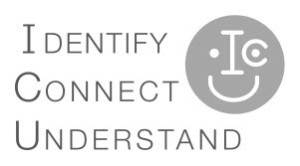It is not often that a blog post idea hits me in a work meeting – at least not while I am actually paying attention. I work on a health care transparency software product and we are adding behavioral health into our platform. In addition to provider and cost search, we are discussing teletherapy and cognitive behavioral therapy programs, too. My customer (a large midwest employer) was talking about the costs associated with mental health issues and de-stigmatizing mental health issues. He mentioned a program that was developed by Dupont and then donated to the The Partnership for Workplace Mental Health from the American Psychiatric Foundation. The program is called ICU. No, it is not the place you go if you are in critical condition.
 The ICU Program is “an awareness campaign designed to decrease the stigma of mental health issues and to foster a workplace culture that supports emotional health.” The ICU Program was developed by DuPont’s Employee Assistance Program and delivered to their 70,000 employees worldwide. DuPont donated ICU to the Partnership, which now makes it available at no cost to employers across all sectors, industries and sizes. It is available in the public domain for any company (or person) to use.
The ICU Program is “an awareness campaign designed to decrease the stigma of mental health issues and to foster a workplace culture that supports emotional health.” The ICU Program was developed by DuPont’s Employee Assistance Program and delivered to their 70,000 employees worldwide. DuPont donated ICU to the Partnership, which now makes it available at no cost to employers across all sectors, industries and sizes. It is available in the public domain for any company (or person) to use.
Why am I telling you this? I think these steps are helpful and useful in the workplace and pretty much anywhere in your life. It is easy to offer someone with a broken leg or a cane help. It can be uncomfortable, or awkward, to ask someone who is under extreme stress or showing signs of depression what you can do to help. A kind act or offer to help (and acknowledgement or validation) could make a world of different to someone who is struggling. This program is super straightforward and only takes 5 minutes. Imagine the difference you could make!
The ICU Program uses a simple analogy. Just as people with a physical injury or illness may require help through an Intensive Care Unit, people with a psychological/emotional injury or illness may require help from one another. They say, “‘ICU’ becomes ‘I See You.’”

This simple program involves three steps:
(1) Identify the signs of distress.
(2) Connect with the person experiencing distress.
(3) Understand the way forward together.
Check out this quick video about emotional health and how to appropriately connect with distressed peers at the workplace who may need support:
What do you think? Pretty cool, huh? I love the simplicity and the applicability to other aspects of life outside the workplace, too!
PS. Make me happy and don’t forget my great giveaways!


